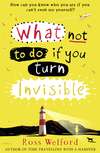Czytaj książkę: «What Not to Do If You Turn Invisible»

Copyright

First published in Great Britain by HarperCollins Children’s Books in 2017
HarperCollins Children’s Books is a division of HarperCollinsPublishers Ltd,
HarperCollins Publishers
1 London Bridge Street,
London, SE1 9GF
The HarperCollins website address is: www.harpercollins.co.uk
Copyright © Ross Welford 2017
All rights reserved.
Cover design © HarperCollins Publishers 2017
Cover illustration © Tom Clohosy Cole
Ross Welford asserts the moral right to be identified as the author of the work.
A catalogue copy of this book is available from the British Library.
All rights reserved under International and Pan-American Copyright Conventions. By payment of the required fees, you have been granted the non-exclusive, non-transferable right to access and read the text of this e-book on screen. No part of this text may be reproduced, transmitted, down-loaded, decompiled, reverse engineered, or stored in or introduced into any information storage and retrieval system, in any form or by any means, whether electronic or mechanical, now known or hereinafter invented, without the express written permission of HarperCollins.
Source ISBN: 9780008156350
Ebook Edition © 2016 ISBN: 9780008156367
Version: 2016-12-02
To Mum, with love
Contents
Cover
Title Page
Copyright
Dedication
Part One
Chapter One
Chapter Two
Chapter Three
Chapter Four
Chapter Five
Chapter Six
Chapter Seven
Chapter Eight
Chapter Nine
Chapter Ten
Chapter Eleven
Chapter Twelve
Chapter Thirteen
Chapter Fourteen
Chapter Fifteen
Chapter Sixteen
Chapter Seventeen
Chapter Eighteen
Chapter Nineteen
Chapter Twenty
Chapter Twenty-One
Chapter Twenty-Two
Chapter Twenty-Three
Chapter Twenty-Four
Chapter Twenty-Five
Part Two
Chapter Twenty-Six
Chapter Twenty-Seven
Chapter Twenty-Eight
Chapter Twenty-Nine
Chapter Thirty
Chapter Thirty-One
Chapter Thirty-Two
Chapter Thirty-Three
Chapter Thirty-Four
Chapter Thirty-Five
Chapter Thirty-Six
Chapter Thirty-Seven
Chapter Thirty-Eight
Chapter Thirty-Nine
Chapter Forty
Chapter Forty-One
Chapter Forty-Two
Chapter Forty-Three
Chapter Forty-Four
Chapter Forty-Five
Chapter Forty-Six
Chapter Forty-Seven
Chapter Forty-Eight
Chapter Forty-Nine
Chapter Fifty
Chapter Fifty-One
Chapter Fifty-Two
Chapter Fifty-Three
Chapter Fifty-Four
Chapter Fifty-Five
Chapter Fifty-Six
Chapter Fifty-Seven
Chapter Fifty-Eight
Chapter Fifty-Nine
Chapter Sixty
Chapter Sixty-One
Part Three
Chapter Sixty-Two
Chapter Sixty-Three
Chapter Sixty-Four
Chapter Sixty-Five
Chapter Sixty-Six
Chapter Sixty-Seven
Chapter Sixty-Eight
Chapter Sixty-Nine
Chapter Seventy
Chapter Seventy-One
Chapter Seventy-Two
Chapter Seventy-Three
Chapter Seventy-Four
Chapter Seventy-Five
Chapter Seventy-Six
Chapter Seventy-Seven
Chapter Seventy-Eight
Chapter Seventy-Nine
Chapter Eighty
Chapter Eighty-One
Chapter Eighty-Two
Chapter Eighty-Three
Chapter Eighty-Four
Chapter Eighty-Five
Chapter Eighty-Six
Chapter Eighty-Seven
Chapter Eighty-Eight
Chapter Eighty-Nine
Chapter Ninety
Chapter Ninety-One
Three Weeks Later
Chapter Ninety-Two
Chapter Ninety-Three
One Week Later
Chapter Ninety-Four
Chapter Ninety-Five
Two More Weeks Later
Chapter Ninety-Six
Acknowledgments
Keep Reading …
Books by Ross Welford
About the Publisher
Just before I fell asleep, I could see myself. I was visible, and I knew who I was.
That was before.
I’m not sure what actually wakes me: the brightness of the sunbed’s UV tubes, or Lady nudging her food bowl by the door between the hallway and the garage.
The purplish lights are so bright that even when I screw my eyes up they are still blinding me.
Have I been asleep?
Why didn’t the timer go off?
How long have I been here?
Crowding out those questions, though, is one main thing and that is how thirsty I am. My tongue’s not even sticking to my mouth, but scratching around inside it. I summon up enough spit to at least get everything working.
I have lifted up the lid of the sunbed and swung my legs over the side. There’s a little pool of sweat – perspiration, Gram would say – left where I’ve been lying. I’m still blinded by the lights and I’m blinking hard but – and this is strange – blinking doesn’t seem to make anything go dark, although there are spots and flashes going off behind my eyes.
With one hand, I grope for the switch on the side of the sunbed, and off go the lights.
That’s better, but only a bit. I still feel awful. I have a stinging headache and I sit for a while.
I should have tested the timer first. As I watch it, the old digital clock on the garage wall flips from 11.04 to 11.05 a.m.
Oh. My. God.
I’ve been under those lights for, like, an hour and a half. Hello, sunburn! Pale skin, red hair (well, auburn), galloping acne and severe sunburn: what a combination.
I stare ahead, letting my eyes become accustomed to the dusty gloom of the garage. There’s the old rolled-up hallway carpet, my kiddie bike that somehow we haven’t chucked away yet, some cardboard boxes of clothes for the church, and raindrops spattering the single narrow window in the door that leads to the back garden.
Probably twenty, even thirty seconds have gone by since I woke up.
Then my phone rings. I look down at it lying on the garage floor and see that it is Elliot flamin’ Boyd – which is not his full name, obviously. I’m not often in the mood to talk to him, so I reach down to switch my phone to silent and let it go to voicemail.
It is a moment that will stay with me for ever.
A moment so strange and terrifying that it’s quite hard to describe, but I’ll give it my best shot.
You see, at first, I don’t notice that I have become completely invisible.
And then I do.
The actions of reaching down, picking up my tinkling phone, finding the silent button, switching it off, and staring at the screen while it vibrates in my hand and then stops … all of those things are so absolutely normal and everyday that I think my brain just fills in the missing stuff.
Missing stuff like my hand, and fingers.
It must be a bit like watching a cartoon. Everyone knows that a cartoon, or any sort of film for that matter, is really a sequence of still pictures. When you watch them quickly, one after the other, your brain fills in the gaps so that it doesn’t look all jerky.
I think that’s what my brain and eyes do in those two or three seconds that it takes to switch off my phone. They just ‘see’ my hand because they expect to see it there.
But not for long.
I blink, and look down at my phone on the floor. Then I look at my hand. I actually hold my hand in front of my face and turn it round.
It is not there.
OK, stop for a minute. Actually hold your hand in front of your face. I’ll wait.
It is there, isn’t it? Your hand? Of course it is.
Now turn it round and examine the other side. This is exactly what I was doing a few seconds ago, only my hand wasn’t – isn’t – there.
At this stage, I’m not scared or anything. More confused.
I think, That’s weird. Has the sunbed affected my mind? Like, am I still half asleep, or dreaming, or having a hallucination or something?
I look down at my legs. They’re not there either, although I can touch them. I can touch my face. I can touch every bit of me, and feel it, but I just cannot see it.
I don’t know how long I’m sitting there, just looking again and again at where I should be. It’s several seconds, but probably not as long as a minute. I’m going through things in my mind, like: has this happened before? Is this in any way normal? Is it my eyes – have I been temporarily blinded by the strong UV light? Except I can see other things – just not me.
Now I’m scared and my breathing has become a bit rapid. I stand up and go to the sink in the corner of the garage where there’s a mirror.
That’s when I scream. Just a little one – more a gasp, really.
Imagine, if you can, standing in front of a mirror and seeing nothing at all. Your face does not look back at you. All you can see is the room behind you. Or garage in this case.
After gasping, I realise what’s going on. I shake my head, smile, and even give a little chuckle. I tell myself, OK, so you must be dreaming. And – wow! – this is a vivid one! It really feels real. You know how some dreams are obviously dreams, even as you’re dreaming them? Not this one! This one is as real a dream as I have ever had, and I start to think it’s quite good fun. Nonetheless, I run through the Am I Dreaming? Checklist, blinking, pinching myself, telling myself, Wake up, Ethel, it’s just a dream.
Except, when it’s done, I’m still there, in the garage. This is one stubborn dream! So I do it all again, and again.
Nope, not a dream.
Definitely not a dream. I stop smiling right there.
I close my eyes tight and nothing happens. That is, I feel my eyelids tightening, but I can still see. I can see around the garage, even though I know I have my eyes shut tight – screwed up, in fact.
I put my hands over my eyes, and I can still see everything.
There’s a lurch in my stomach of fear, dread and terror, which is a horrible combination when they all come together. Without warning, I throw up into the sink, but I cannot see anything coming out. I hear it splatter. I taste the hot puke in my mouth. Then, in a second or two, it materialises as I watch: my half-digested cornflakes from before.
I run the tap to wash it away. I put my hand into the stream of water and the water takes its shape. I stare, awestruck, as I lift a palmful to my thirsty mouth and this bubble-like piece of water rises up before me. I suck it up then look in the mirror again: my lips are almost visible for a second where the water has touched them, and I can just make out the liquid as it starts to go down my throat, and then it’s gone.
I am consumed with a horror that is more intense than anything I have ever felt before.
Standing in front of the mirror, gripping the sides of the washbasin with my invisible hands, with my brain practically throbbing with the effort of processing this … this … strangeness, I do what anyone would do.
What you would do.
I scream for help.
‘Gram! GRAM! GRAM!’
A WARNING
I’m going to tell you how I got to be invisible, and discovered a whole load of other stuff as well.
But if I’m going to do that, you need a bit of what my teacher Mr Parker calls ‘backstory’. The stuff that led up to me being invisible.
Stick around for a couple of chapters. I’ll keep it brief, and then we’ll be back in the garage, with me being invisible.
However, the first thing I’d better do before I continue is to warn you: I am not a ‘rebel’.
I only say this in case you’re hoping I’m going to be one of those daredevil kids who is always getting into trouble and being ‘sassy’ to grown-ups.
That is, unless you count becoming invisible as getting into trouble.
As for the time I swore at Mrs Abercrombie: that was an accident, as I have said a thousand times. I had meant to call her a ‘witch’ – which, I admit, is rude enough in itself, but not as rude as the word I used by mistake that rhymes with it. It got me into a LOT of trouble with Gram. To this day, Mrs Abercrombie thinks I’m a very rude girl even though it was more than three years ago and I wrote her a letter of apology on Gram’s best notepaper.
(I know she’s still angry because her dog Geoffrey always snarls at me. Geoffrey snarls at everyone, but Mrs Abercrombie always says, ‘Stop it, Geoffrey’ – except when he snarls at me.)
Anyway, usually I just sit quietly at the back at school, minding my own business, getting on with my stuff – la-la-la, don’t-bother-me-and-I-won’t-bother-you kind of thing.
But you know what grown-ups say, in that way they have that’s designed to make them seem clever, ‘Ah, you see – it’s always the quiet ones, isn’t it?’
That’s me. A ‘quiet one’. So quiet that I’m almost invisible.
Which, come to think of it, is quite funny.
How far back do you want to go?
If you ask me, it all started with the pizza thing. That was what got me so upset that I kind of lost a bit of my mind, and then ended up losing a lot more.
This is how it happened.
Jarrow Knight – who else? – shouted, ‘Pizza delivery!’ when I walked in the class, and pretty much everyone laughed. Not a LOL sort of laugh – more a spluttering cackle. Most people in my class are not actually cruel.
I didn’t get it at first. I had no idea it had anything to do with me. In fact, I thought it was some joke that I had walked in on halfway through, and so I smiled and laughed a bit as well, like you do when you don’t want to feel left out.
That must have looked odd, in hindsight.
Then a couple of days later, Jarrow, her brother, and some others were walking past me when I was talking to the girls outside the chemistry labs, and Jarrow said in a loud-ish voice, ‘Did you order the American Hot, Jez?’, and they high-fived, while Kirsten and Katie looked at their feet.
Do you get it? It still hurts to remember. (There’s going to be quite a lot of hurting and remembering, so we may as well get used to it.)
‘Pizza delivery’ is a reference to my face.
‘Pizza face’ = acne. That is, spots and zits and boils and the whole pimply shebang. You get it, yeah? The reference, not acne.
My face supposedly resembles the surface of a pizza. Hilarious. It doesn’t, anyway. It’s not as bad as that.
Acne on a twelve-year-old? I know, it’s kind of early. Even Dr Kemp said I was ‘at the earlier end of the spectrum’, but it’s not freakish. No, ‘freakish’ we’ll reserve for the acne itself, which is ‘towards the more severe end of the spectrum’. That’s nice family-doctor-speak for ‘Jeez, you’ve got it bad’.
I’ll spare you the details. You might be eating while you’re reading this and the details are not very nice.
So that was about three months ago. I realised a couple of things with those words, ‘Pizza Face’:
1 My policy of keeping a low profile at school had met with only limited success. Everyone knows Acne Girl. Up till that point, most of the mean stuff had been directed at Elliot Boyd, which was fine by me. Except, now I was a target too.
2 I honestly think some people reckon that you can catch acne. I mean, I’m not some saddo who spends the entire day alone, surrounded by people taunting her. It’s just that the whole ‘best friends’ thing is taking longer than I expected and I wonder if the acne is the cause? Gram says, ‘Just be yourself’, which sounds like good advice. I guess it is good advice if you have a reasonable idea of who you are – and I do. Or at least I did, until everything started to go wrong. Gram also says, ‘If you want a good friend, then be a good friend.’ She’s full of stuff like this. I sometimes think she collects it. Problem with that one is that there is a distinct lack of people around to be a friend to.
3 Jarrow Knight is a total nightmare. That’s not exactly a revelation but along with her twin brother the pair of them are pure poison.
4 I have got got got to do something about my skin.
My acne started about a year ago with a single, tiny pimple on my forehead. That pimple, I like to think, was sent as an advance scout by the Acne Army. It reported back to Pimple HQ, and within weeks a full regiment of spots and blackheads had encamped on my face and nothing I did could beat them back.
And then the Acne Army started colonising other parts of me. My neck hosted a small platoon of boils, which are actually large, shiny and painful. My chest had a company of tiny blackheads, which occasionally grew into whiteheads with pus in them, and within two months there was an expeditionary force annexing my legs.
Worst of all, though, Gram doesn’t really take me seriously and that is driving me nuts.
‘Spots, darling? You poor thing. I had spots too, and so did your mum. It’s just a phase. You’ll grow out of it.’
Even before the pizza incident, school had become much less fun than primary. It was just a coincidence, but at the same time as all this was happening, Flora McStay – who was probably my best friend – moved to Singapore, and Kirsten Olen was moved to a different class and started hanging out with the Knight twins.
Of whom more later.
The point is, I needed a plan to get rid of the acne, and that’s how the sunbed and the Chinese medicine entered my life.
And no, becoming invisible wasn’t part of the plan. That would definitely be ‘at the extreme end of the spectrum’.
Nor – in case it needs to be said – was getting any closer than strictly necessary to Elliot Boyd.
So, we’re still on backstory and you’re still around, which is good.
Elliot Boyd, eh? ‘Smelliot’ Boyd as he’s known, because someone once made the joke and it kind of hangs around him like his smell is supposed to.
The kid that no one likes.
Is it his height? His weight? His hair? His accent?
Or, in fact, his smell?
It could be any of them, and all of them. He’s a big bear of a boy, as tall as a couple of the teachers, with a large stomach, and a chin with a fuzz of blond hair on it that I imagine he thinks disguises the fact that there’s another chin beneath it.
As for his smell, to be honest, he doesn’t seem to smell that bad, though I go to some lengths not to test the widely held belief that he is a stranger to soap and deodorant by simply avoiding him.
I think it’s his manner that grates on people. Overconfident, pushy, cocky, loud, and – my favourite, this one – ‘bumptious’. That was Mr Parker’s word, and he’s very good with words.
You know what, though? I think it’s just because he’s from London. Honestly. People took against him from day one because he started slagging off Newcastle United (he’s an Arsenal fan, or so he claims). Round here, unless you’ve got a very good excuse, you follow Newcastle. Possibly Sunderland or Middlesbrough. But definitely not a London football team – not even, it turns out, if you’re actually from London.
Boyd came into our class on the first day of Year Eight. No one knew him, so you’d think he would have kept his head down a bit, but no. I think he thought it was funny, what he did on his first day – you know, bold and a bit cheeky, but it didn’t come across like that.
As well as taking us for Physics, Mr Parker’s our form teacher who does the register and stuff. He clapped his hands and cleared his throat.
‘Welcome back, you lucky people, to the north-east’s finest edifice of erudition. I trust you all had a restful break? Splendid.’
He talks like that a lot, does Mr Parker. He used to be an actor and wears a cravat, which – incredibly – looks quite cool on him.
‘We have a new addition to our class! All the way from sunny London … Thank you, Mr Knight, booing is for boors … Please give it up for Mr Elliot Boyd!’
Now, at this point, the class – who had done this routine a couple of times before with new kids – would usually applaud on Mr Parker’s cue, and the new kid would look all shy and smile a bit and go red and that would be that.
Elliot Boyd, though, immediately stood up and raised both hands in the air in a triumphal gesture and said loudly, ‘Ar-sen-al! Ar-sen-al!’, which killed the applause dead. To make matters worse, he added, in his best London accent, ‘Wot? You lot ain’t never ’eard of a propah footbaw team?’
Wow, I thought at the time, way to become instantly unpopular, Elliot Boyd!
From that moment, at least half the class decided that they hated him.
Yet it didn’t seem to put him off, or make him any less pushy. Elliot Boyd was like one of those large, shaggy dogs that lollop up to other, smaller dogs in the park and freak them out.
Worse, he then started to hang around my locker after school, as if – just because we shared part of the route home – we should automatically be friends.
Fat. Chance.
I would have carried on ignoring him, except he was about to become part of what happened, and how I ended up turning invisible.

















